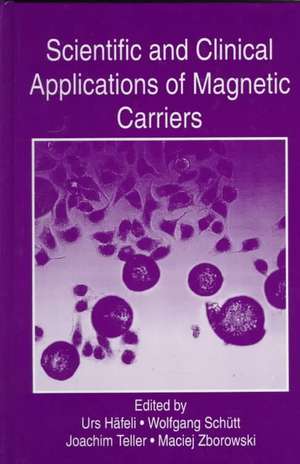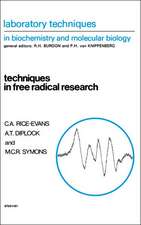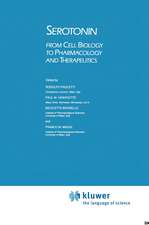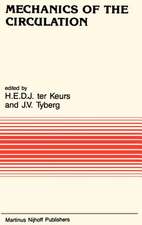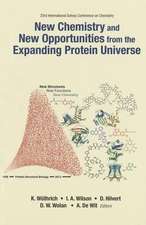Scientific and Clinical Applications of Magnetic Carriers
Editat de Urs Häfeli, Wolfgang Schütt, Joachim Teller, Maciej Zborowskien Limba Engleză Hardback – 30 iul 1997
| Toate formatele și edițiile | Preț | Express |
|---|---|---|
| Paperback (1) | 1832.22 lei 6-8 săpt. | |
| Springer Us – 30 noi 2010 | 1832.22 lei 6-8 săpt. | |
| Hardback (1) | 1846.28 lei 6-8 săpt. | |
| Springer Us – 30 iul 1997 | 1846.28 lei 6-8 săpt. |
Preț: 1846.28 lei
Preț vechi: 2251.56 lei
-18% Nou
Puncte Express: 2769
Preț estimativ în valută:
353.28€ • 368.85$ • 292.39£
353.28€ • 368.85$ • 292.39£
Carte tipărită la comandă
Livrare economică 04-18 aprilie
Preluare comenzi: 021 569.72.76
Specificații
ISBN-13: 9780306456879
ISBN-10: 0306456877
Pagini: 628
Ilustrații: XV, 628 p.
Dimensiuni: 156 x 234 x 37 mm
Greutate: 1.29 kg
Ediția:1997
Editura: Springer Us
Colecția Springer
Locul publicării:New York, NY, United States
ISBN-10: 0306456877
Pagini: 628
Ilustrații: XV, 628 p.
Dimensiuni: 156 x 234 x 37 mm
Greutate: 1.29 kg
Ediția:1997
Editura: Springer Us
Colecția Springer
Locul publicării:New York, NY, United States
Public țintă
ResearchDescriere
The discovery of uniform latex particles by polymer chemists of the Dow Chemical Company nearly 50 years ago opened up new exciting fields for scientists and physicians and established many new biomedical applications. Many in vitro diagnostic tests such as the latex agglutination tests, analytical cell and phagocytosis tests have since become rou tine. They were all developed on the basis of small particles bound to biological active molecules and fluorescent and radioactive markers. Further developments are ongoing, with the focus now shifted to applications of polymer particles in the controlled and di rected transport of drugs in living systems. Four important factors make microspheres interesting for in vivo applications: First, biocompatible polymer particles can be used to transport known amounts of drug and re lease them in a controlled fashion. Second, particles can be made of materials which bio degrade in living organisms without doing any harm. Third, particles with modified surfaces are able to avoid rapid capture by the reticuloendothelial system and therefore en hance their blood circulation time. Fourth, combining particles with specific molecules may allow organ-directed targeting.
Cuprins
Preparation and Modification of Biodegradable Magnetic Particles: Preparation and Application of Monosized Magnetic Particles in Selective Cell Separation; W.S. Prestvik, et al. Characterization of Magnetic Particles: Intravenously Injected Particles: Surface Properties and Interaction with Blood Proteins - The Key Determining the Organ Distribution; R.H. Müller, et al. Applications in Cell Separation and Analysis: Physics of the Magnetic Cell Sorting; M. Zborowski. Applications in Molecular Biology: Magnetic Separation in Molecular Biology; M. Bosnes, et al. Biomedical Applications of Magnetic Carriers: Overview of Magnetic Separations Used in Biochemical and Biotechnological Applications; I. Safarík, M. Safaríková. Drug Delivery and Radionuclide Therapy: Targeting Magnetic Microspheres to Brain Tumors; S.K. Pulfer, J.M. Gallo. MRI-Contrast Agents: Magnetic Nanoparticles as Contrast Agents for MR Imaging: An Overview; J.W. Bulte, R.A. Brooks. Hyperthermia: Magnetic Fluid Hyperthermia (MFH); A. Jordan, et al. 36 Additional Articles. Index.
